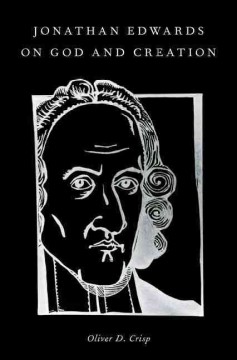 Oliver Crisp draws swords in his book, "Jonathan Edwards on God and Creation", and assails all of Edward's most controversial ideas, including Edwards famous writings on Occasionalism, Idealism in the Trinity, Continuous Creationism, Panentheism, Double Predestination and more! This book contains excellent summaries and critiques of Jonathan Edward's speculative theology. Crisp explains what Edward's believes, how others have gotten Edwards wrong all along, and exposes the real problems with Edward's novel ideas. I was surprised how critical Crisp was of Edwards over all, and even though Crisp was right, I had hoped to hear some arguments on how the problems may be worked through in Edward's theology but the results seem to be a cul-de-sac.
Oliver Crisp draws swords in his book, "Jonathan Edwards on God and Creation", and assails all of Edward's most controversial ideas, including Edwards famous writings on Occasionalism, Idealism in the Trinity, Continuous Creationism, Panentheism, Double Predestination and more! This book contains excellent summaries and critiques of Jonathan Edward's speculative theology. Crisp explains what Edward's believes, how others have gotten Edwards wrong all along, and exposes the real problems with Edward's novel ideas. I was surprised how critical Crisp was of Edwards over all, and even though Crisp was right, I had hoped to hear some arguments on how the problems may be worked through in Edward's theology but the results seem to be a cul-de-sac.
Here's an excellent example of how Crisp was able to summarize Jonathan Edward's position on Panentheism:
P1. The world exists "in" God. (Call this the core thesis.)
P2. God is not the world. God and the world are distinct entities. (The antipantheism thesis)
P3. God is essentially creative. He must create a world because it is in his nature to create a world. He is "disposed" to create a world. (The essential divine creativity. (The necessity of creation thesis.)
P4. Although it is radically contingent on divine fiat, this world is the necessary product of God's essential creativity. (The necessity of creation thesis).
P5. The world is created by eternal divine fiat, though it begins to exist in time. (The eternal creation thesis.)
P6. God must create the best possible world. (The best possible world thesis.)
P7. The created world is ideal; it exists in the divine mind. (The immaterial antirealist thesis.)
P8. God continuously creates the world ex nihilo. God eternally decrees that no created thing persists through time; each "moment" of creation is numerically distinct from the previous one; God constitutes these many world-stages as one four-dimensional entity, namely, "the world" (i.e., the created order). (The four-dimensionalist continuous creation thesis.)
P9. God is the sole causal agent, that is, the efficient cause of all that comes to pass. (The occasionalist thesis.)
- Oliver Crisp, Jonathan Edwards On God And Creation, pg142-144
Crisp does an excellent job exposition the problems with Edwardsian Divine Excellency, Occassionalism-Continuous Creationism, Consummation and many other topics. Maybe he will produce another volume on Edward's Ecclesiastical Writings! Overall, this is an excellent book, that anyone who has studied Jonathan Edward's speculative theology would deeply appreciate. Crisp may have won the battle, but the Sage of Northampton will win the war!
Related: Continuous Creationism, Idealism, Jonathan Edwards, Occasionalism, Oliver Crisp, Panentheism



Leave a comment